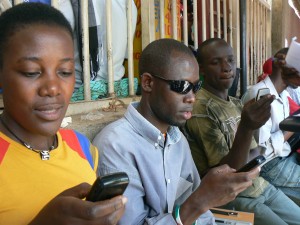 By Kike Oyenuga, FrontlineSMS Project Assistant
By Kike Oyenuga, FrontlineSMS Project Assistant
The ICT4D community has often turned its head towards the potential role of mobile in African development. But a challenge posed by the Royal African Society at an event at London’s School of African and Oriental Studies last week was: “Are the claims that mobiles are aiding development as clear as they seem?”
FrontlineSMS Founder, Ken Banks, participated in the debate titled, “Mobile technology: Developing Africa?” which set out to offer fresh perspectives to this increasingly analyzed sector. Ken was joined on a panel by Marieme Jamme, CEO of SpotOne Solutions and co-founder of Africa Gathering and Nick Short, a lecturer at the Royal Veterinary College who is working in mobile disease surveillance in East Africa.
The panel discussed the ways in which mobile technology is helping both to improve the flow of information both within development organizations and also providing increased access to information in Africa more generally. The discussion covered a range of topics; the role of innovation, the many potential uses of mobile for development, and the role of corporate responsibility of mobile phone operators and manufacturers.
The presenters gave accounts from their personal experiences working with mobile technology in their respective fields, and explained why it is such a valuable tool with broad application potential. Also discussed were the challenges of applying mobile technology effectively in rural or remote settings and the importance of scaling down technology to fit the capacity of the people using it the most.
Drawing on his experience of combining his role as a veterinarian with technology, Nick Short spoke of using mobile mapping and geo-spatial tools in his work in documenting and tracking livestock diseases and possible epidemics and said that the technology could be used in many types of crisis mapping. He gave the current East Africa food security issue and real-time aid donation as prime examples.
Adding to a point emphasized in Marieme’s presentation - on the importance of mobile technology to maintain connectivity to vulnerable communities - Ken then focused on the macro view of how mobile technology can transform engagement of development and aid work. He noted the challenge that people with various skill sets are often located far from the people they are helping, and it is by connecting these groups that stakeholders can benefit from each other.
Technology allows more people to be involved in the process of development, by strengthening capacity and simultaneously allowing those that benefit to have agency in how technology is applied in their respective communities. Citing multiple examples of this, Ken elaborated on the use of FrontlineSMS technology in the poll monitoring process by Nigerians during the recent presidential elections, as an example where people were empowered to conduct election monitoring on their own terms.
Questions for the panel underscored the continued debates around mobile’s role in African development. One audience member questioned whether mobile phone companies were being socially responsible enough in giving back to the communities that they profit from. This was underlined by her assertion that companies provide a vital service to people in developing nations yet set the cost of phone credit at a price prohibitive to most. This audience member also wondered at the irony of it costing less to call Africa from the UK than someone in Africa calling her. Ken’s response was that we needed to a look at the broader picture. He highlighted the fact that much of the mobile infrastructure that we see across Africa today was built by private sector investment, and that if rolling out telecommunications across the continent had been an international aid project we’d likely not be anywhere near where we are today.
An overarching message embodied by the discussion was that the development community musn’t be mesmerized by technology, rather it should focus on the context in which it will be used and allow for appropriate solutions to evolve while bearing that in mind.
